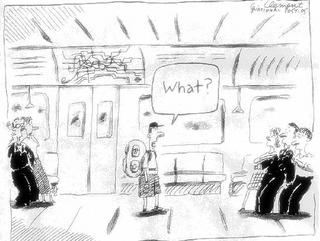There is conjecture that the London terrorists might have been 'unwitting' suicide bombers.The evidence (this is John O'Sullivan from the Chicago Sun-times)
They bought return railway tickets. Their bombs were not strapped to their bodies but carried in knapsacks as if to be left behind on the trains. None of them was heard to shout the customary ''Allah Akhbar'' before the bombs exploded. Unusually for suicide bombers, they left identification on their bodies. And surveillance videotapes show them laughing and joking casually -- rather than grimly determined or prayerful -- as they caught the Underground train.
The suggestion by some, almost sounds sympathetic:
"The bombers' masters might have thought that they couldn't risk the four men being caught and spilling everything to British interrogators," an official said. "The stakes were too high, so they could have lied to them and deliberately sent them to their deaths."
But the most dizzying suggestion comes from the family of one of the terrorists. From the National Post (subscribers only):
The wife of Germaine Jamal Lindsay, 19, the Jamaican-born Muslim convert who killed 26 people on the Piccadilly Line near Russell Square, insisted he was not a suicide bomber.
"Lindsay would never have killed himself and left me alone to bring up our children," said Samantha Lewthwaite, 22, who has a 15-month-old son and is eight months pregnant with the couple's second child.
So, Lindsay would have boarded a crowded train, dropped off a knapsack filled with explosives and blown up as many innocent strangers as he could -- but he was too decent a fellow to leave his wife and children widowed and orphaned.
Forgive me for being insensitive, but exactly how would not wanting to kill himself make him any less vile, any less guilty, any less of a terrorist?
Apparently the British and American governments worry more about suicide bombers than the run- of-the-mill terrorist. They are more determined, more radical, less easily deterred etc.
I don't see it. Even within radical Islam, I suspect that fewer people are willing to blow themselves up, than to dump a bomb somewhere and make haste. Neither takes any great amount of courage -- one is a coward who murders innocent people, the other is a coward who murders innocent people and believes he will be rewarded -- doesn't take a lot of guts to do something when you figure your god is going to see you as a hero. Either way, their victims are maimed and dead -- so who cares?
Anyone who plans to murder other people -- whether they are IRA or al-Qaida is a shell without a soul. If they happen to decide to eliminate themselves in the process, I don't see how that can be a bad thing.
canadianna
